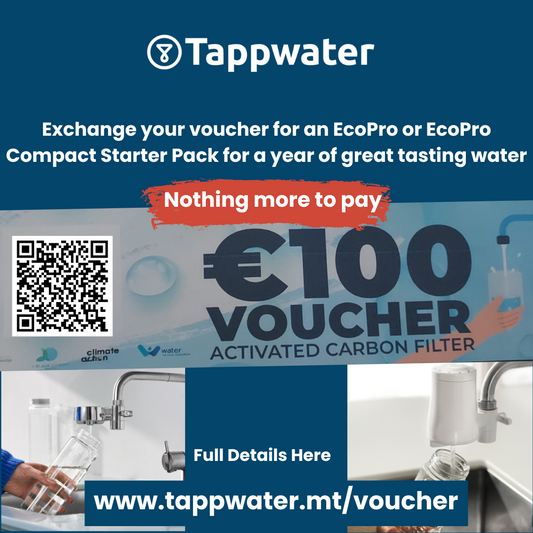#TAPPZero - the circular economy solution for water filters in Malta
Share
On the occasion of European Waste Reduction Week 2021 in Malta TAPP Water Malta is launching our latest programme #TAPPZero in which we move towards a circular economy solution for water filters in Malta.
The launch of the programme is the first step towards putting a circular economy solution in place for the distribution of TAPP Water filters and is being launched on the back of receiving the Malta Climate Action Award 2021 for Agent Of Change.
TAPP Water in Malta as of October 2021 is now enabling households to eliminate over 1 million plastic bottles a year from the environment in Malta. This is a huge achievement for the 1,500 households in Malta that have made the change to the TAPP Water EcoPro water filter.

#TAPPZero is about reaching further, aiming higher and moving towards that goal of leaving no waste from our operations.
#TAPPZero is only possible by collaborating with other partners who share our desire for a more sustainable Malta. The first partner who accepted the challenge was our zero emission delivery partner E-Deliv who will now collect used TAPP Water filter refill cartridges and return them to ourselves for processing.
In regards to the recycling, reusing and reprocessing of the filter refill cartridges we do not yet have all the answers. However, we are launching #TAPPZero at this moment so that we can begin to collect the raw material on which we can test and refine our porcesses.
We have also are receiving help and information from a number of sources which we will be able to write about in due course - one tangible benefit from winning an award such as the Malta Climate Action Award 2021 for Agent Of Change is the number of organisations and government departments that are ready to assis with finding solutions we can implement for #TAPPZero and it is inspiring to see how many knowledgeable resources and scientific skills we have available on our beautiful island of Malta.
So we take a first step launching #TAPPZero and more shall be revealed as we work towards the ideals of a cicrular economy in Malta.

What is a circular economy?
The circular economy is an alternative model to our current linear economy, based on three principles: circularity, recycling and dematerialization. It puts the emphasis on reducing waste - by reusing materials wherever possible ,by designing products withan end-of-life in mind ,and by recycling or repurposing material wherever possible.
This results in reduced waste, higher resource efficiency and lower environmental impact and so more material is recycled and less ends up in landfills.
The circular economy model overcomes some of the shortcomings of our current economic model , like pollution, limited natural resources and scarce energy sources
Malta can become a circular economy country by using its resource efficiency to grow its economy while avoiding the pitfalls of an ever-growing global population that demands more resources.
Circular strategies can reduce waste by as much as 70-90% by taking this approach there is no 'waste disposal', but rather an emphasis on making the most of what we have available.
In a circular economy, companies are encouraged to produce less waste in the first place. This can be done by reusing materials - for example ,manufacturers using reusable packaging.
A circular economy is not just about recycling , it is about using resources in circular ways that will result in less waste of resources and therefore lead to greater efficiency.
For example, circular economy supporters point out that recycling aluminium can reduce carbon emissions by up to 90% compared to making new aluminium from ore.
An increase in circularity means reducing emissions because the carbon emitted during one process becomes locked up and stored within another product or process, reducing the need to make new products from raw materials
According to studies by McKinsey , circularity can reduce resource use by as much as 70% compared with a linear model. Resource efficiency is the key focus of circular economy thinking .
A circular economy is more collaborative, based on sharing and supported by the right policies and in Malta, circular economy is a policy that can be used to unlock business growth and boost our economic activity. The circularity of the circular economy ensures that resources are kept in use for as long as possible, rather than being thrown away after a single use.
The circularity of the circular economy ensures that resources are kept in use for as long as possible
Data used in circularity models shows that circular businesses are larger, employ more people and deliver greater economic benefits to society . The circular model relies
Malta can become a circular economy country by implementing circular policies and circular business models, Malta's small size, environment and logistics can all be huge advantages in making steps towards a circular economy.
What do you think? Can Malta become more of a cicular economy?







![[WATCH] Malta's Tap Water Challenge: The Tappwater Solution. A Look at the Science, the Tests, and the Deliciously Clean Results.](http://tappwater.mt/cdn/shop/articles/Why_We_lab_tested_maltas_water_Sqaure.png?v=1756738451&width=533)